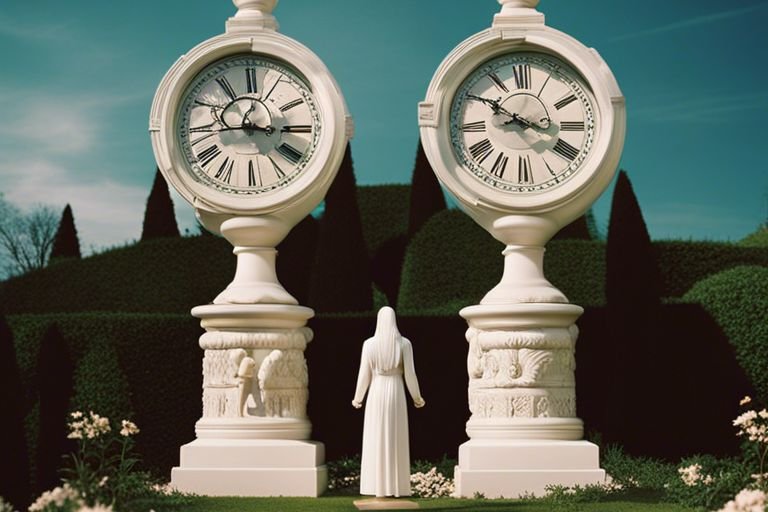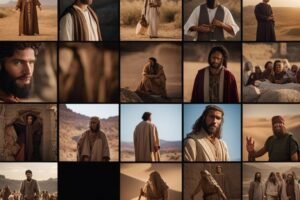Greetings, fellow seekers of knowledge. As a scholar and enthusiast of religious studies, I often find myself pondering the age of our ancestors, Adam and Eve. The story of Adam and Eve has been a fundamental part of various religious traditions for millennia, and their age has been a subject of much debate. In this guide, I will delve into the religious texts and ancient sources to uncover the age of humanity’s most famous ancestors and shed light on the significance of their age in religious tradition. Whether you are a curious mind or a devout believer, join me as we embark on this journey to unravel the mystery surrounding the age of Adam and Eve.
Key Takeaways:
- Diverse Interpretations: The age of Adam and Eve varies in different religious traditions and texts, leading to a wide range of interpretations.
- Biblical Age: The Bible does not explicitly state the age of Adam and Eve, leaving space for speculation and debate among scholars and believers.
- Symbolic Significance: Some religious interpretations view the age of Adam and Eve as symbolic rather than literal, representing the beginning of humanity.
- Scientific Perspective: The age of humanity’s ancestors according to religious tradition often contrasts with scientific evidence and evolutionary theories, sparking ongoing discussions.
- Impact on Beliefs: The age of Adam and Eve and humanity’s ancestors has a profound influence on religious beliefs, shaping perceptions of creation, original sin, and the human origin story.
Investigating the Age of Adam and Eve in Religious Tradition
Your quest to understand the age of Adam and Eve in religious tradition will take you on a fascinating journey through biblical accounts and historical perspectives. By delving into these sources, we can gain a deeper insight into the beliefs and interpretations surrounding the age of humanity’s ancestors.
Biblical Accounts of Adam and Eve’s Age
According to the Book of Genesis in the Bible, Adam lived to be 930 years old. Eve’s age is not specifically mentioned in the biblical text. The account of their creation and the events that followed provide a foundation for understanding the age of humanity’s ancestors in religious tradition. These biblical narratives form the basis for many religious beliefs and interpretations about the age of Adam and Eve.
Historical Perspectives on the Age of Humanity’s Ancestors
Throughout history, scholars, theologians, and religious leaders have grappled with the age of humanity’s ancestors in religious tradition. The interpretations and perspectives have varied across different religious traditions, contributing to an ongoing dialogue about the age of Adam and Eve. From early church fathers to contemporary theologians, the historical perspectives offer a diverse range of views that continue to shape our understanding of this topic.
Factors Influencing the Age of Adam and Eve
The age of Adam and Eve in religious tradition is influenced by a variety of factors. These factors include cultural and geographical variations, interpretation of religious texts, scientific data and fossil records, and theological beliefs. Each of these factors plays a role in shaping the perceived age of humanity’s ancestors in religious tradition. Recognizing the complexities of these factors is crucial in understanding and evaluating the age of Adam and Eve from a religious perspective.
Cultural and Geographical Variations
Cultural and geographical variations have contributed to diverse interpretations of the age of Adam and Eve across different religious traditions. Different cultures and regions have their own historical and religious narratives, which have influenced the perceived age of humanity’s ancestors. Additionally, variations in religious practices and beliefs have also played a role in shaping the understanding of Adam and Eve’s age.
Scientific Data and Fossil Records
Scientific data and fossil records have provided valuable insights into the age of humanity’s ancestors. The study of archaeological evidence and fossil records has offered important information regarding human origins. While some religious traditions may view this scientific data as conflicting with their beliefs, others have sought to reconcile religious teachings with scientific findings.
Religious Traditions and Their Views on the Age of Humanity’s Ancestors
Unlike scientific understanding, religious traditions have their own perspectives on the age of humanity’s ancestors. These perspectives are deeply rooted in the sacred texts, beliefs, and teachings of each tradition. In this chapter, I will investigate the views of Christianity, Islam, and Judaism on the age of humanity’s ancestors.
Christianity
In Christianity, the age of humanity’s ancestors is a topic of much debate. The Old Testament provides a genealogy of Adam to Abraham and beyond, which has led some Christian scholars to estimate the age of humanity’s ancestors to be around 6,000 to 10,000 years old. This interpretation is based on the belief in a literal interpretation of the Bible. However, other Christian scholars argue that the genealogies in the Bible are not necessarily meant to be taken as a precise chronological record, allowing for a more flexible understanding of the age of humanity’s ancestors.
Islam
In Islam, the age of humanity’s ancestors is believed to be in line with the scientific understanding of the age of the earth and the development of human civilization. While the Quran does mention Adam and Eve as the first humans, it does not specify their age or the age of humanity’s ancestors. This allows for a more flexible interpretation that can be in harmony with scientific discoveries. Some Islamic scholars believe that the age of humanity’s ancestors cannot be definitively determined from religious texts and that it is open to interpretation based on scientific evidence.
Judaism
In Judaism, the age of humanity’s ancestors is also a matter of interpretation. The Hebrew Bible provides genealogical records that some scholars use to estimate the age of humanity’s ancestors to be around 6,000 to 10,000 years old. However, just like in Christianity, there are Jewish scholars who argue that the genealogies in the Bible are not necessarily meant to be taken as a precise chronological record and that a more flexible understanding of the age of humanity’s ancestors is possible. Overall, the views on the age of humanity’s ancestors in religious traditions are diverse and open to interpretation.
Conclusion: How Old Are Adam and Eve – Investigating the Age of Humanity’s Ancestors in Religious Tradition
Presently, the age of Adam and Eve and humanity’s ancestors continues to be a subject of debate and speculation in religious tradition. While the Bible provides some guidance on the age of humanity’s first ancestors, interpretations and beliefs vary widely among different religious denominations. It is important to acknowledge that the age of Adam and Eve is ultimately a matter of faith and interpretation rather than scientific certainty. Whether one believes in a literal or symbolic interpretation of their age, it is crucial to approach the topic with an open mind and respectful understanding of differing beliefs. As we continue to explore the origins of humanity in religious tradition, it is essential to recognize and appreciate the diverse perspectives and interpretations that contribute to our understanding of our shared heritage.
FAQ
Q: What is the age of Adam and Eve according to religious tradition?
A: According to religious tradition, Adam and Eve are believed to have lived around 6,000 years ago.
Q: How is the age of Adam and Eve determined in religious tradition?
A: The age of Adam and Eve is determined based on genealogies and timelines mentioned in religious texts such as the Bible.
Q: Are there any scientific findings regarding the age of Adam and Eve?
A: Scientific findings do not support the traditional age of Adam and Eve, as the evidence points to the existence of human ancestors that lived thousands of years before the estimated time of Adam and Eve.
Q: What are the different interpretations of the age of Adam and Eve in religious communities?
A: Different religious communities may have varying interpretations of the age of Adam and Eve, with some adhering strictly to the traditional timeline and others incorporating scientific evidence to adjust their beliefs.
Q: How does the age of Adam and Eve impact religious beliefs and practices?
A: The age of Adam and Eve influences the way religious beliefs and practices are interpreted, particularly in relation to the creation of humanity and the origins of sin and redemption as described in religious texts.









